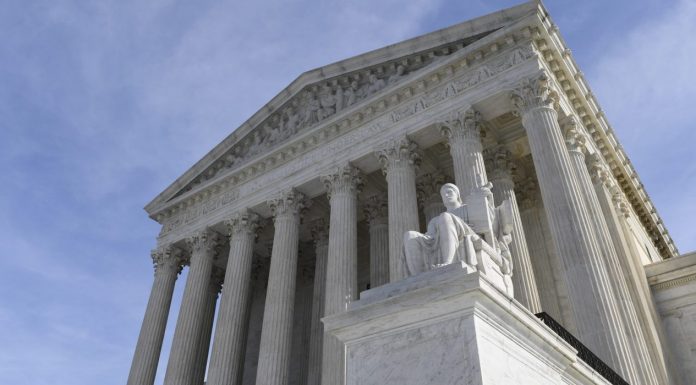(Headline USA) The Supreme Court says it will hold a special session in just over two weeks to weigh challenges to two Biden administration policies covering forced vaccine requirements for millions of workers, policies that affect large employers and health care workers.
The high court’s announcement that it will hear arguments in the cases Jan. 7 comes amid rising coronavirus cases and is an extraordinarily fast timeline. The court had not been scheduled to hear cases again until Jan. 10.
A three-judge panel of the 6th U.S. Circuit Court of Appeals in Cincinnati ruled 2-1 on Friday that the vaccine or testing regime for workers at larger companies could take effect. The plan requires workers at larger companies to be vaccinated or wear face masks and get tested weekly. The requirement could affect some 84 million U.S. workers.
The 6th Circuit’s ruling was one of the few to go in favor of Biden’s tyrannical mandates, the implementation of which have been stayed by several courts. In fact, the 6th Circuit’s ruling that impacts large businesses overturned previous rulings to pause the mandate, with one court saying the order had “grave statutory and constitutional issues.”
Republican-led states, conservative organizations and businesses had challenged the requirement after the Occupational Safety and Health Administration published the rule in early November. The rule was to go into effect Jan. 4.
The high court also will hear arguments over a rule published Nov. 5 by the Centers for Medicare & Medicaid that applies to a wide range of health care providers that receive federal Medicare or Medicaid funding. It requires their workers to receive the first dose of a COVID-19 vaccine by Dec. 6 and be fully vaccinated by Jan. 4. It was projected to affect more than 17 million workers in about 76,000 health care facilities as well as home health care providers.
Decisions by the New Orleans-based 5th U.S. Circuit Court of Appeals and St. Louis-based 8th U.S. Circuit Court of Appeals as well as a federal judge in Texas have the mandate blocked in about half of states.
In a statement Wednesday evening after the court announced it would hear arguments, the White House defended its policies and said that especially with the rise of the coronavirus’ omicron variant, “it is critical to protect workers with vaccination requirements and testing protocols that are urgently needed.”
Despite Biden’s bellowing, which cited no hard evidence supporting a mandate’s efficacy, employers have repeatedly warned that the mandates could cost jobs and will almost certainly cause price hikes for consumer products.
As a backdrop to the Supreme Court’s looming decision, there stands a stark reminder of why it has reached this point and why the U.S. District Court for the Western District of Louisiana originally ruled against the mandate.
“If the executive branch is allowed to usurp the power of the legislative branch to make laws, two of the three powers conferred by our Constitution would be in the same hands,” wrote Judge Terry Doughty. “If human nature and history teach anything, it is that civil liberties face grave risks when governments proclaim indefinite states of emergency.”
The high court’s decision to quickly hold arguments on the requirements was unusual. Both issues arrived at the court on an emergency basis, and the court usually quickly decides emergency applications without the more typical full briefing and oral argument.
But the court has also been criticized recently for how it handles the process, which has been called the court’s “shadow docket.” Justice Samuel Alito pushed back in September against that criticism, saying it was unwarranted.
The Supreme Court announced earlier this year that all the justices have been vaccinated. Because of the coronavirus, however, the court is not open to the public. Lawyers arguing cases must test negative COVID-19 and journalists observing arguments must also have a negative test.
Adapted from reporting by the Associated Press

